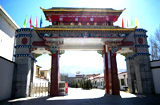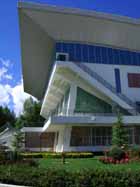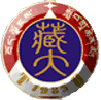Tibet University
Tibet University is located in Lhasa, the capital city of the Tibetan Autonomous Region. The tree-lined, grassy campus has a total area of 300,000 square meters, with a total dormitory space of 70,000 square meters. The university has been actively involved in China's national
scientific research programs as well as those of Tibet Autonomous
Region. The university and its staff have won many prizes for
scientific achievements in the field of Tibetan research, including
the collating of folk music, developments in Tibetan art, developments
in Tibetan language computer software, astronomical observation
and research, the development and use of natural resources, and
Tibetan demography, to name a few. Included among Tibet University's
numerous research areas (centers) are: the Story of King Gesar
Research Section, the Astronomical Research Section, the Population
Research Section, and the China-Korea Tibetan Cultural Arts Research
Section. There are currently 1,400 students enrolled at Tibet University. In addition to local students, there are currently approximately 40 foreign students from over ten different countries studying the Tibetan language.
Tibet University presently offers degrees in seven major areas of study: Tibetan Language; Chinese and English; Politics and History; Mathematics and Physics; Chemistry, Biology and Geography; Tibetan Art and Music; and Economic Management. In total, the university offers 19 subjects, in two of which students can obtain masters degrees, and ten of which they can obtain bachelor degrees. Enrollment for the various courses popular among international students is as follows: Tibetan language class; Tibetan Music class; Tibetan Art class; Tibetan language summer program which last four to eight weeks. The academic year runs from early September to July. All courses will be conducted in Tibetan, with at least ten students in each class. Usually two different class levels will be offered: a low intermediate to intermediate course and a high intermediate or advanced course. Each class has instructional sessions in modern Tibetan language from 9 am 每 1 pm Monday through Friday, which combine lecture, drill and dialogue. Classes at all levels will involve rigorous training in listening, speaking, grammar, reading and the Tibetan writing system. Optional elective courses and lectures are also offered in areas such as Tibetan history, folklore, religion, customs and culture. In addition, 3-4 visits are arranged to surrounding historical and cultural sites relevant to Tibetan Studies, with explanations provided by a teacher; additionally, field trips within the city of Lhasa is organized. These social activities will introduce students to Tibet's rich cultural heritage and contextualize their language lessons with cultural instruction. Classes on additional subjects such as Tibetan art, instrumental music, specialized textual study, regional dialects, etc, can usually be arranged on request.
Tibet University boasts a staff of 320 full-time teachers, 35 vice-professors and approximately 170 lecturers. Many teachers have been sent abroad, and foreign experts and academicians have been invited to teach at the school. Tibet University has thirteen Tibetan language teachers, and all courses are taught in Tibetan. Currently, there are about 40 international students, and this figure will continue to rise. Each class has between ten and 20 students. There are three levels of classes offered 每 beginner, intermediate, and advanced. According to an entrance test, students will be placed in the appropriate class, and will have four lessons in the mornings. Afternoons are dedicated to practice, and the school also hosts occasional lectures.
Library The campus houses a 22,000-volume library, and a computer lab as well as a computer network center which is connected to China's educational network. After registering with the library, students have full access to all of its services from the current opening times of 3:30 pm 每 9 pm. Recreation Facilities The campus has football pitches, basketball courts, volleyball courts, a running track, cafeteria and student centre. There are also plenty of gyms, bars and KTV bars near the campus. Private sports and swimming facilities are available about 15 minutes away from the campus by bicycle or taxi. Laundry Although there are no drycleaners on campus, there are several in the shopping streets nearby. Washing machines are provided in the international students' dormitory block, while a laundry shop can be reached within 2-3 minutes walking distance. Money & Banking Although there is no bank on campus, ATMs and Chinese bank branches are not far away, offering a range of services for international students, including money transfers and foreign currency exchange. Students can also open a bank account at the bank of their choice for greater convenience during their period of study. Medical Care There is a medical clinic on campus with 24-hour service. There are also several larger hospitals nearby the university. Food & Groceries The university area has plenty of grocery stores, and students can make use of their kitchenettes to cook in the dormitory building.However, the average cost of breakfast (RMB 4), lunch and dinner (RMB 7 each) makes eating in the canteens very reasonable. These on-campus restaurants generally offer Chinese food, particularly spicy dishes, with a special canteen for international students. There are numerous internet cafes, shops, teahouses and restaurants within 2-3 minutes of the dormitory. Western restaurants and tourist facilities are about 15-20 minutes walking distance from the university. Postal Services A post office is located nearby, about 10-15 minutes walking distance from the campus.
Students reside in international dormitories at Tibet University which are fitted with a range of standard amenities. Each student will have a single or double room with a toilet. All rooms have telephones, internet access, and a television with cable connections to some 50 Chinese and Tibetan channels. International students have access to washing machines located inside the dormitory block. In addition, a restaurant providing lunch is attached to the student dormitory.
The university campus is situated in the west of Lhasa. The main Tibetan areas and traditional temples of the city (i.e. the area around the Barkhor) are about 15-20 minutes walk from the university. Students can easily visit local restaurants and shops and converse with people there in order to practice their language skills. Distance from the airport: One hour by bus or taxi. Distance from the train station: 30 minutes by taxi. |

 Tibet University (TU) is a comprehensive university whose main
purpose is the training of teachers in the Tibet Autonomous Region.
It was established in July 1985, taking over from the former Tibet
Teachers' College. Tibet University was originally founded in
1951 as the Tibet Cadres School.
Tibet University (TU) is a comprehensive university whose main
purpose is the training of teachers in the Tibet Autonomous Region.
It was established in July 1985, taking over from the former Tibet
Teachers' College. Tibet University was originally founded in
1951 as the Tibet Cadres School.  Tibet University has seen excellent results in developing relations
with ten foreign institutes of higher education from other countries
and regions, and since 1993 foreign students have been admitted
for enrollment. Because of its unique location and commitment
to higher learning, Tibet University has excellent conditions and
a positive environment for the study of Tibetan language and customs.
Since 1999, foreign students have also been accepted to study Tibetan
Music and Tibetan Art.
Tibet University has seen excellent results in developing relations
with ten foreign institutes of higher education from other countries
and regions, and since 1993 foreign students have been admitted
for enrollment. Because of its unique location and commitment
to higher learning, Tibet University has excellent conditions and
a positive environment for the study of Tibetan language and customs.
Since 1999, foreign students have also been accepted to study Tibetan
Music and Tibetan Art. 